
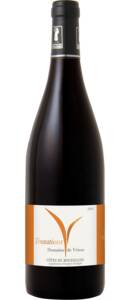
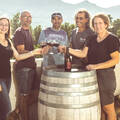
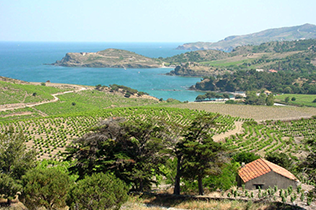
Formerly a part of Catalonia (the province of Roussillon used to be part of the Government of the Counts of Roussillon and Cerdagne), the plain of Roussillon existed from 1659 until the creation of the Eastern Pyrenees department in 1790). It thus retains its distinctive character (despite its annexation to Languedoc), rooted in its landscapes, its ethic roots and its wine styles.



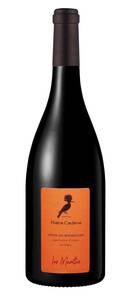


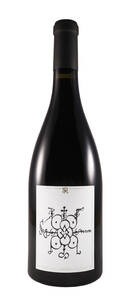
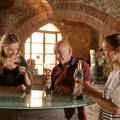


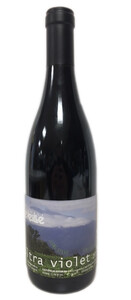
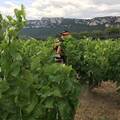
It offers a historical know-how, driven by an almost-Spanish climate, particularly favorable to the culture of plums, cherries, peaches, apricots, nectarines and of course GRAPES.
The specialty of Roussillon used to traditionally be a great variety of natural sweet wines, in which the barely fermented sweet grape juice is stabilized by a good dose of grape marc brandy (a technique that was discovered long before the distillation of stronger substances). Classified as the only “Grand Cru” in France, the Banyuls is the most revered of these natural wines. It is made from Grenache grown on rocky terraced vineyards, just North of the Spanish border. Producers of natural sweet wine use all kinds of methods to trap the sun of their region into their wines. Some leave the young wine in large glasses or barrels and let it cook in the sun, while others use a complex system of movement between barrels of different sizes and ages. Most leave the wine to cook for some time under the rafters for at least one summer. The result is wines that can vary from light red to deep brown, often with a very grapy flavor and sometimes having an almost rancid, hazelnut taste called “rancio”. Banyuls “Grand Cru” wines must be raised in wooden barels for more than two and a half years, but certain wine facilities choose to extend aging for many years in order to produce unique and balanced wines, recommended by many notorious palates as ideal partners for chocolate.
In the past, the non-vinified wines of Roussillon were generally less renown, but this is becoming less and less true: this phenomenon is becoming more and more marked in the upper valley of Agly, inside the lands of Perpignan, where the old vines drawing from their schist soils can produce red wine of a very high quality, deeply aromatized, standing for pleasure and always great to share with friends at the aperitif or with a red meat. They also produce fine, minerally and intensely unique white wines, that first and foremost pay tribute to the generous Catalan Mediterranean cuisine. They can accompany anchovies of Collioure, an apricot salad or even some oysters (these wines are often labeled PGI (Protected Geographical Indication) Côtes Catalanes since this corner of France does not have its own controlled appellation). The Côtes du Roussillon-Villages appellation is limited to the northern third of the Roussillon region, with the recent Côtes du Roussillon Les Aspres, created for the superior wines of the South. Many of the sturdy areas as well as the heady whites of Roussillon are simply labelled Côtes du Roussillon.
The Roussillon vineyard, like the Languedoc vineyard, is part of the Languedoc-Roussillon production region. This exploitation distinguishes itself with its different cultivations (nectarines, peaches, plums...), but above all for its grapes.
The vineyard of Roussillon is located after the Languedoc vineyard. Located near the Spanish border, it is surrounded by the Albères, Canigou and Corbières massifs, as well as the Mediterranean Sea. The landscape of this part of France is made of alluvial plains, hills, terraces and mountainous foothills.
The Roussillon region benefits of a Mediterranean climate. Each year, it is therefore entitled to a hot and dry summer. The autumn is marked by heavy rainfalls which turn into thunderstorms during the spring period.
The diversity of soils in the area gives a wide variety of Roussillon wines. Throughout the vineyard, you will discover sub-soils composed of schist, alluvial terraces, gneiss, limestone, clayey-limestone and granite soils.
Roussillon wines have a long history. The estate is characterized by its natural sweet wines. These are obtained thanks to an ancient technique which consists in mixing grape juice with grape marc brandy.
To make their drinks unique, winegrowers use many different processes. Ageing the product under the rafters or in jars left out in the sun, transfer techniques between different barrels, everyone has their own little recipe.
From these various processes, the Banyuls was born. It is the only natural wine in Roussillon to be awarded the Grand Cru label. It is generally aged in wood for 2 and a half years and more. Some winegrowers even go beyond this period. This allows them to have a unique and balanced drink.
The Roussillon vineyard is also known for its non-vinified wines. In the past, these were only moderately successful. Today, this situation is about to change. The old vines in the production area now produce high-quality, highly aromatic reds. They also offer whites of great finesse.
This wine-growing region of France produces different appellations. A large majority of red wines with robust flavours and heady whites are grouped under the AOC Côtes-du-Roussillon. Wines produced in the northern part of the vineyard benefit from the Côtes-du-Roussillon-villages appellation. The superior wines from the south are grouped under the Côtes-du-Roussillon-Les-Aspres appellation.
To discover the Roussillon vineyard and learn more about its various appellations, go visit some of the wineries. The Res Fortes Wines opens its doors in the Agly valley. You will learn a lot about grape growing thanks to this estate which has opted for a biodynamic farming.
You will also learn a lot about the wine region at Domaine Lafage in Perpignan. The Domaine Lafage brings together different terroirs and produces special wines. During your visit, remember to buy Roussillon wines at Les Grappes.
When it comes to wine products from the region, you are spoilt with choice. For more pleasure during the aperitif and to accompany red meat, opt for red wines. In the mood for Catalan Mediterranean cuisine at dinner? Serve oysters, Collioure anchovies or apricot salad with white Roussillon wines.
Travelling through this beautiful region? Visit the wine estates of Languedoc-Roussillon.
